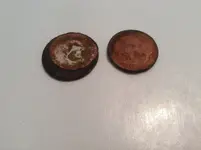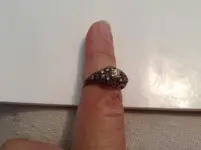Here's a copy of my previous post for cleaning w/ baking soda (and added pix of my results):
I wouldn't recommend vinegar-- to harsh unless a common coin. Baking soda won't hurt it, but rubbing it might. Here's my method: 1) Take a small glass jar and put a layer or two of aluminum foil on the bottom of it. 2) Pour baking soda in the jar to fill it halfway or more. 3) add water to just cover the baking soda. Stir it up a bit so all the baking soda is wet. 4) add more baking soda so you have a thick wet paste. 5) put the coin just into the surface of the baking soda so it is covered BUT NOT TOUCHING THE FOIL. Lay it flat so it doesn't sink down too fast. 6) take an old pan and fill it 1/3 full of water, and set the jar in the middle of the pan on the stove. Turn up the heat to bring the water in the pan CLOSE to boiling but NOT BOILING. If it starts to boil, take the pan off the stove right away. 7) let it simmer for about 30 minutes. 8) recover the coin and rinse it off in cold water. Handle it gently and DON'T RUB IT! If the crust doesn't fall off, you might try this a couple more times, but be patient with it or you could mess up the coin. (Worse case scenario, the crust will fall off and you'll find that the coin has been run over several times and is messed up anyway...)
This method has worked well for old silver quarters I've found on the beach with sand crust stuck to them. Silver oxides, halides, and sulfides are reduced back to pure silver and the coin comes out looking like it is fresh from circulation.
I do need to qualify this-- not sure if glue (or whatever) will fall off or not. If the coins stuck together because of corrosion your silver will clean up nicely. If it has epoxy (or some other goo) I can't say what will happen. For a coin with carbon-based muck I have been known to take a blow torch to it and roast the hydrocarbons off of it and clean it, but that is for something already compromised and not worth much!





 Nice finds !!
Nice finds !! 


